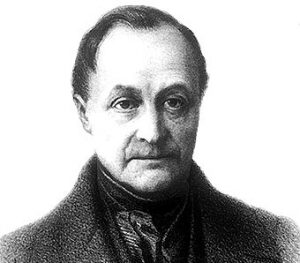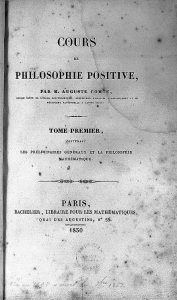The philosopher Ortega y Gasset said in his work La idea de Principio en Leibniz (written in 1947, but published in 1958)
“By 1860 the continuity of the seriously philosophical tradition had been lost, even in Germany. Up to the point that even the classics of modern and contemporary philosophy were not well understood. Instead of philosophy, there was an intellectual eau-de-vie called positivism. This positivism had little to do with that of Comte [1798-1857], the creator of the term. Comte’s philosophy is a very great one that still waits to be understood. This is a tribute to justice. The reigning positivism in Europe around 1860 was that of Stuart Mill and other Englishmen, and the English, who have done such great things in physics and in almost all orders of the human being, have shown themselves incapable of this form of fair play that is philosophy”.

Indeed, the word ‘positivism’ represents a current of thought, but hardly anyone is very clear about what it refers to, except for vague commonplaces such as the law of the three stages, the relevance of facts or the rejection of metaphysical considerations. In fact, outside the field of sociology, where he is considered the founder, little is known, studied or said about Comte, and yet his general vision of science and knowledge made a decisive contribution to Western thought during the whole of the 19th century and a large part of the 20th. His influence even gave its motto to the flag of Brazil, “Ordem e Progresso” (Order and Progress), the only country where there are also temples to the religion of humanity, founded by Comte in the latter years of his life.

However, it is not his entire philosophy that we will talk about here, but only about what concerns mathematics. After all, Comte is a mathematician, trained at one of the best French schools of the moment, the École Polytechnique, where part of the French intellectual elite is still educated. He was a ‘répétiteur’ (a kind of course tutor, like an assistant teacher) at the same institution, although he never got a regular teaching post and ended up moving away from the academic world. The work for which he is best known is his monumental Cours de Philosophie Positive, published in six volumes between 1830 and 1842. The lessons that conform the course began in 1826 and were attended by important scientists of the French and international scene such as Joseph Fourier and Alexander von Humboldt.
But although Comte was trained as a mathematician and was a professor of analysis and mechanics, he has no outstanding contributions as a mathematician, although mathematics has a fundamental place in his conception of knowledge:
“In the present state of development of our positive knowledge, it is convenient, I believe, to look at mathematical science, less as a constituent part of properly natural philosophy, than as being – since Descartes and Newton– the true fundamental basis of all this philosophy, although, to speak precisely, it is both one and the other. Today, in fact, mathematical science is much less important for the very real and very precious knowledge that nevertheless directly composes it, than as constituting the most powerful instrument that the human spirit can employ in the investigation of the laws of natural phenomena” (Comte, Cours, Lesson 2).
For Comte, mathematics is the first step on the scale of human knowledge, and the most important because mathematics provides knowledge with a structure. Only a highly mathematical science will reach the highest level of development (what he calls the positive state). Mathematics is in itself a valuable knowledge, but it is even more so as a method of structuring other knowledge. For Comte, mathematics has the ability to avoid the fragmentation of knowledge, providing unifying methods and possibilities of connection between different disciplines. It thus constitutes the backbone of his philosophical system, but it is also the core of his educational conception, for for Comte “any scientific education that does not begin with this study will be wrong at its core”.

Mathematically based science education is a major aspect of Comte’s world view. Comte does not see education as exclusive to economic or intellectual elites, but should be available to the whole of society. Proof of this is his Philosophical Treatise on Popular Astronomy, written for the Parisian factory workers in the early industrial revolution. In fact, Comte did not separate his vision of science from his political vision, since any social improvement, from his perspective, involved “thinking more scientifically”, with the idea that, from the knowledge of mathematics, one could aspire to a better society.
Further readings:
Bourdeau, M., Pickering, M. & Schmaus, M. 2018. Love, Order, & Progress. The Science, Philosophy and Politics of Auguste Comte, Pittsburgh, University of Pittsburgh Press.
Pickering, M. 1993-2009. Auguste Comte. An Intellectual Biography, 3 Vols., Cambridge, Cambridge University Press.

Leave a Reply